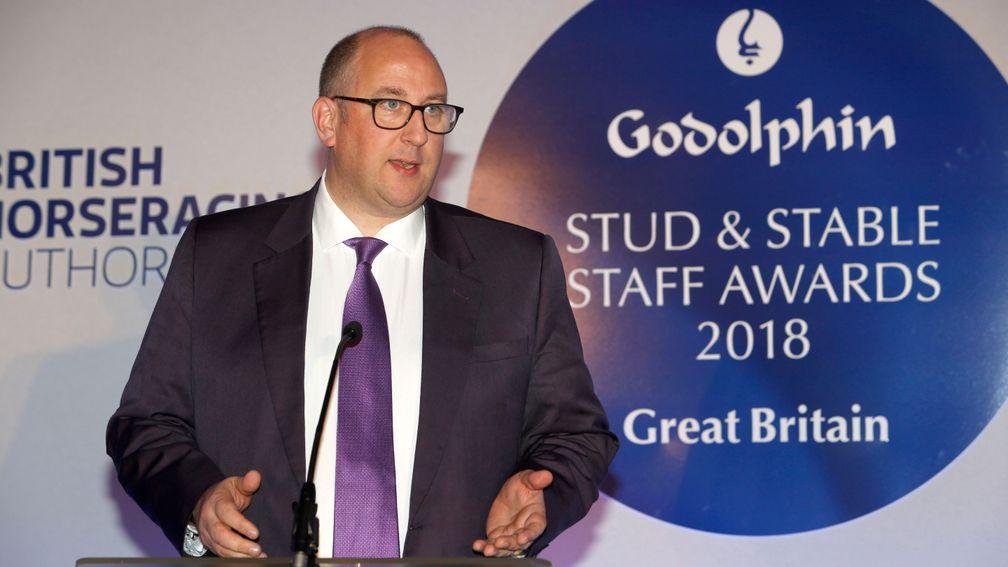Rust: Level playing field needed to avoid Brexit border problems

BHA chief executive Nick Rust has called for a level playing field in the way the sport is regulated between Britain, Ireland and France in order to help maintain free movement of horses after Britain leaves the European Union.
The requirement for breeders or owners to notify the birth of a foal within 30 days for all horses born in Britain was cited as one example which Rust would like to see adopted by Ireland and France, while the declaration of wind operations is likely to be another. Rust was speaking at the National Equine Forum in London on Thursday on the subject of equine welfare.
The tripartite agreement between Britain, Ireland and France which allows free movement of horses for racing and breeding ends after Brexit.
Rust said that unless the UK and European governments are convinced those privileges should be maintained there was "the very real possibility of border controls".
He added: "Given that one third of horses that run in British racing are imported each year from Ireland or France that would have a significant impact on our industry and also on the breeding industries, not only here but in Ireland and France.
"We would like to see a level playing field between Ireland, France and Britain in terms of the regulations in each country pertaining to the movement of animals, but also in respect to the way horseracing is operated.
"That high health, high welfare status is absolutely key if we are to convince our government to keep the borders open and to keep the prosperity of British racing intact over the next few years."
Northern Ireland question
Breeders in Northern Ireland are not regulated by the BHA and are therefore not required to notify foal births within 30 days.
Following a question on the status of breeders in Northern Ireland, Rust said: "We want to see a level playing field with France and Ireland through this as well.
"I would sincerely hope they will follow suit, it would make sense to do so. If we are looking for harmonisation on horse movement and traceability then it would make sense for that to happen."
Earlier Lord Gardiner, the under secretary of state for rural affairs and biosecurity, had told the event the government was aware of the critical role of the tripartite agreement.
He added: "My priority for day one is movements to continue with minimal delay and bureaucracy, whilst safeguarding welfare, biosecurity and disease control. Where change is necessary let us work together to ensure it is in the interest of the horse and ourselves."
Equine welfare paramount
Rust emphasised the importance of equine welfare to racing, saying: "Without it we will have no sport and no social licence to be able to continue to operate."
He cited polling figures which claim 30 per cent of people would have horseracing banned while another 20 per cent were uncomfortable about some aspects of the sport.
"So we cannot ever rest on our laurels, especially with a young generation of millennials who are increasingly urbanised," Rust said.
He added: "We've seen a big shift in the way in which government and the opposition parties are looking at animal welfare. Attitudes have changed a heck of a lot over the years and we can take nothing for granted."
Rust said he believed the sport was becoming less inward looking and recognised the need for transparency.
"The main thing for British racing is we must keep ahead of public opinion and continue to challenge ourselves about some of the norms that have been accepted in our sport for a long time," he added.
Published on inNews
Last updated
- Join Racing Post Members' Club for the very best in racing journalism - including Patrick Mullins' unmissable trip to see Gordon Elliott
- Racing Post Members' Club: 50% off your first three months
- Join the same team as Ryan Moore, Harry Cobden and other top jockeys with 50% off Racing Post Members' Club
- 'It’s really exciting we can connect Wentworth's story to Stubbs' - last chance to catch master painter's homecoming
- The jumps season is getting into full swing - and now is the perfect time to join Racing Post Members' Club with 50% off
- Join Racing Post Members' Club for the very best in racing journalism - including Patrick Mullins' unmissable trip to see Gordon Elliott
- Racing Post Members' Club: 50% off your first three months
- Join the same team as Ryan Moore, Harry Cobden and other top jockeys with 50% off Racing Post Members' Club
- 'It’s really exciting we can connect Wentworth's story to Stubbs' - last chance to catch master painter's homecoming
- The jumps season is getting into full swing - and now is the perfect time to join Racing Post Members' Club with 50% off